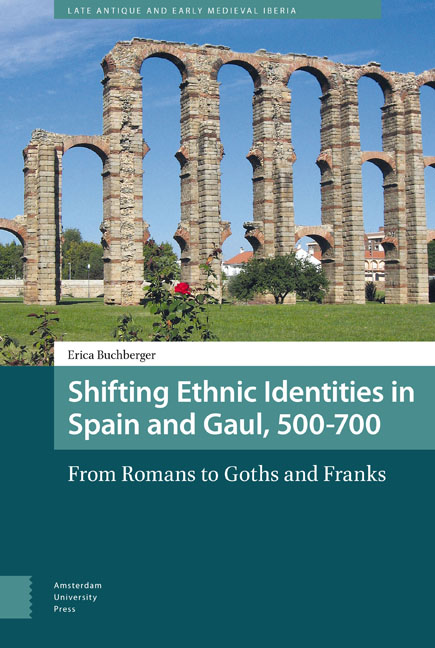7 - Frankish Hagiography
Published online by Cambridge University Press: 12 February 2021
Summary
While both Gregory and Fortunatus wrote a handful of saints’ vitae, some of which I have already discussed, the majority of the hagiographical texts for the sixth and seventh centuries are the work of others. A look at the full corpus for these two centuries confirms that the focal shift from a Roman to a Frankish society was not solely the invention of a few cunning authors, but a trend occurring throughout their society.
In these saints’ vitae, two main points become clear. First is that Frankish identity came to be discussed more often in political terms over the course of the two centuries, as an inclusive label that could encompass all within the kingdom. Sixth-century hagiographers used ‘Frank’ less often than seventh-century ones, and their language when using it is reminiscent of Gregory’s. Kings of the ‘Franks’ and Franks as an army make appearances, and a few individuals are described as ‘a Frank’ or ‘a certain Frank’. In seventh-century texts, individuals are often said to be Franks ‘by birth’, which at first glance might seem counter to a unifying Frankish identity. However, they regularly appear alongside Burgundians, Romans, or Saxons ‘by birth’, all of whom are included in group descriptions of ‘the Franks’. Only some were Franks by descent, but all were Franks by political affiliation. This political usage is far more frequent in seventh-century texts than in earlier ones, and is responsible for the great increase in the use of the term ‘Frank’ generally during this century. ‘Kingdom of the Franks’, for example, is present on multiple occasions, while it is absent completely from sixth-century vitae.
The second key trend is that Roman identity was asserted more frequently in seventh-century vitae, undoubtedly because it was coming to be seen as exceptional and thus especially worth noting. As with Gregory's Histories, Romanness as a local identity is completely absent from sixth-century examples. This makes Venantius Fortunatus’ poetry the only literary source from this period in which locals appear explicitly as Roman. In contrast, nine vitae spread fairly evenly across the seventh and very beginning of the eighth centuries mention local ‘Romans’. Almost all of these are Roman ‘by birth’, and all but one came from south of the Loire.
- Type
- Chapter
- Information
- Shifting Ethnic Identities in Spain and Gaul, 500–700From Romans to Goths and Franks, pp. 165 - 178Publisher: Amsterdam University PressPrint publication year: 2017

